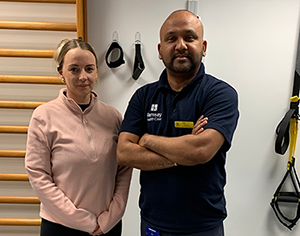What is a Hiatal Hernia?
A hiatal hernia is when a part of your stomach pushes up through a hole in your diaphragm muscle, the muscle that separates your chest from your abdomen. If you have a hiatal hernia part of your stomach is in the lower part of your chest.
A hiatal hernia is also called a hiatus hernia as the opening in your diaphragm that your stomach pushes through is called the hiatus.
Types of hiatal hernia
There are two main types of hiatal hernias:
- Sliding hiatal hernia – by far the most common type of hiatal hernia. Your stomach intermittently slides up into your chest through the hiatus and back down and out of your chest area. A sliding hiatal hernia does not stay in a fixed position but it moves up and down. It is also known as a type 1 hiatal hernia.
- Para-oesophageal hiatus hernia – a portion of your stomach pushes up into your chest next to your oesophagus and remains fixed or still. Paraesophageal hiatus hernias can be referred to as type II, III and IV hiatal hernias.
- A stage 3 hiatal hernia is a mix of the two main types called sliding hiatal hernias and paraesophageal hiatal hernias. This means that the part of your oesophagus that connects to your stomach (the gastroesophageal junction) slides up through the hiatus at times and another part of your stomach also sometimes pushes up into your chest adjacent to your oesophagus.
How serious is a hiatal hernia?
Although most hiatal hernias aren’t serious or even cause any symptoms. If the hernia develops bigger and is left untreated, they can lead to serious complications, so it’s important to know the signs and symptoms that indicate when you should seek medical attention . Read our blog around when to worry about hernia pain here.
What are the symptoms of a hiatal hernia?
A hiatal hernia often causes no symptoms. Some people experience hiatal hernia symptoms that are similar to gastroesophageal reflux disease (GERD) symptoms. This is because GERD occurs when acid and digestive juices move from your stomach back into your oesophagus. These symptoms include:
- Heartburn – a painful burning feeling in your chest, often after eating
- An unpleasant bitter or sour taste in your mouth
- Bringing up small amounts of food or liquids back into your mouth
- Bloating or burping
- Feeling or being sick
- Bad breath
- Trouble or pain swallowing
- Discomfort or pain in your stomach
- Shortness of breath
Hiatal hernia pain
Some people may also suffer from hiatal hernia pain including chest and abdominal pain. Pain could be a sign that your hiatal hernia is getting worse, some people may feel pain during everyday activities such as coughing, lifting etc.
What are the causes of hiatal hernia?
What causes a hiatal hernia is not entirely clear. However, hiatal hernia causes can include:
- Congenital - being born with a larger than usual hiatal opening
- Injury - to the hiatus area
- Ageing – may weaken your diaphragm. Hiatal hernias are more common if you’re over 50
- Pressure rises in your stomach - pregnancy, being overweight or obese, coughing, physical strain, lifting something heavy, or straining on the toilet.
How is a hiatal hernia diagnosed?
If you think you may have a hiatal hernia you should see your doctor. They will consider your medical history, examine you, and typically arrange for one or more diagnostic tests like an endoscopy which is a procedure that allows a doctor to examine inside the stomach and esophagus or barium swallow which is an c-xray of the upper digestive system.
Treatment for a Hiatal Hernia
Hiatal hernia treatment may include lifestyle changes, medication and surgery.
Medication
Hiatal hernia treatment may include lifestyle changes, medication and surgery. You doctor will discuss the best treatment options for your hiatal hernia based on multiple factors such as your general health and anatomy, the extent and location of your hiatal hernia, and the severity of your symptoms.
Lifestyle modifications include changing your eating habits such as eating smaller and more frequent meals, losing weight and stopping smoking.
Over-the-counter or prescribed stronger medications may be recommended to manage your hiatal hernia symptoms.
Surgery
Hiatal hernia surgery may be advised if other hernia treatments have not worked and you continue to experience severe reflux problems or if there's a risk of serious complications. Keyhole surgery is usually used for a hiatus hernia. This involves making small cuts in your abdomen. Hiatal hernia surgery involves:
- Pulling your hiatal hernia back into your abdomen.
- Mending the valve at the bottom of your oesophagus.
- Closing the hole in your diaphragm muscle.
A laparoscopic Nissen fundoplication (LNF) is the standard procedures to repair a hiatal hernia. It permanently relieves your hiatal hernia symptoms. During laparoscopic Nissen fundoplication surgery, your surgeon wraps your upper stomach (called the fundus) around the lower part your oesophagus to create a permanently tight sphincter that prevents your stomach from moving back into your chest.
The operation is performed under general anaesthetic and lasts for up to 90 minutes.



